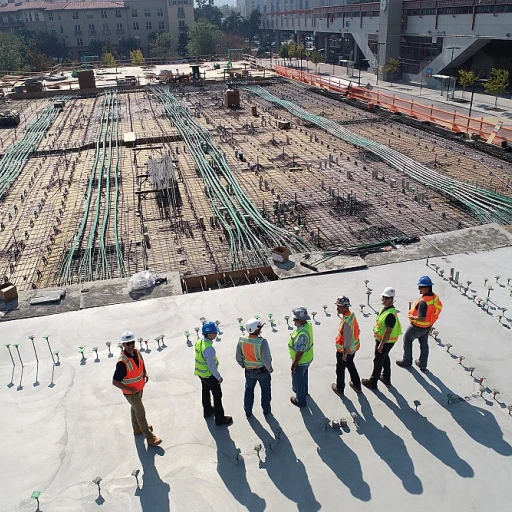
Understanding the Importance of Public Praise
Highlighting Achievements: The Power of Public Praise
Recognizing the efforts and accomplishments of employees is vital in maintaining a motivated and productive workforce. Public praise is integral to management leadership since it not only boosts the morale of the individual being praised but also inspires team members who witness it. It's important for leaders to distinguish between effective praise public and mere flattery. Genuine public recognition impacts people's engagement levels, fostering a supportive work environment. The concept is centuries-old, yet it remains effective. Like in sports, where renowned coaches excel in praising public to fuel their teams’ success, business leaders can adopt similar strategies. Taking a page from legendary leaders, organizations today continue to reap benefits from praising public. Doing so enhances emotional intelligence and builds trust among team members, which contributes to a cohesive workplace culture. However, one must not overlook the balance required between public recognition and constructive criticism. For managers looking to embark on this approach, it is crucial to create a culture of open feedback. This can be achieved by structuring praise public strategically, to amplify its impact. Leaders must consistently share sincere appreciation, which helps cement the respect and loyalty of their employees. Effective feedback, whether it is public recognition or private criticism, requires awareness and strategy. Building proficiency in public praise opens the door to effective, respectful, and productive conversations. This balance is further explored through essential inquiries for HR navigating AI in human resources, which underscores the integration of artificial intelligence to support and enhance traditional HR practices. In addition to these practices, leveraging AI tools can help streamline the process of identifying opportunities for public praise. As the corporate landscape evolves, the role of public praise and recognition continues to be more relevant, demanding a combination of technology and emotional intelligence to sustain a thriving work environment.The Role of AI in Facilitating Private Corrections
The Role of Advanced Tools in Ensuring Privacy
In any workplace environment, balancing criticism and praise is essential for maintaining employee morale and productivity. While public praise can foster a sense of recognition and motivation within a team, private feedback and correction address specific areas for improvement. This delicate balance is crucial for effective management leadership and the strategic use of AI in human resources can offer solutions to achieve it.
With AI-driven human resources systems, organizations can adeptly provide private criticism and corrections to their employees. Such systems secure these interactions from the scrutiny of the team while offering a way to maintain employee dignity. The role of AI here hinges on its ability to target feedback precisely, ensuring that it is constructive, timely, and appropriately handled. This approach is crucial to foster emotional intelligence within leadership and boost building trust among team members.
AI-powered tools allow leaders to monitor performance, address concerns in private, and tailor their feedback according to each individual's style of work. Equipped with data-driven insights, leaders can ensure that feedback addresses the needs of both the organization and the person receiving it. This personalized approach minimizes feelings of embarrassment that can arise from criticism delivered in a public setting.
A pivotal advantage of AI tools lies in their capability to differentiate between effective private feedback and potentially harmful public criticize. By providing analytics and insights into communication patterns, AI solutions help leaders determine the optimal channels for delivering their feedback. Ensuring that criticism is kept private plays a critical role in preserving trust and protecting an employee's self-worth.
Furthermore, an AI-informed approach can tackle issues such as pay discrimination and work equity through comprehensive integrations, contributing to a guide to evidence and AI tools that ensure fair treatment and recognition of team members.
Balancing Public Praise and Private Correction with AI
Harnessing AI for Optimal Feedback Dynamics
In the realm of acknowledging achievements and addressing areas for improvement, striking the right balance between public praise and private correction is crucial in maintaining employee morale and enhancing productivity. AI technology can play a transformative role in facilitating this balance, ensuring that team members receive recognition and feedback in an effective manner that aligns with management goals. Public praise is more than a mere pat on the back; it is an essential aspect of team management that fosters a culture of recognition and appreciation. When leaders publicly acknowledge the accomplishments of their team, it not only boosts individual motivation but also serves as an example for peers to aspire to. In this context, AI tools can help identify instances of exceptional performance and suggest the appropriate moments for public recognition, which can lead to strengthened team dynamics. Indeed, praising public behavior can generate a sense of belonging and drive among employees. On the flip side, there exists a complementary need for correcting private missteps. The role of AI in delivering private criticism is invaluable. By providing leaders with insights, AI enables a tactful and discreet approach to addressing areas where a person may require improvement. This methodology, often referred to as radical candor, respects an employee's privacy while promoting honest and constructive feedback that can improve work performance. The emphasis here is on building trust and respect, rather than public criticism that can diminish morale. AI systems can serve as silent auditors, monitoring team member performance discreetly and flagging potential issues to leaders before they escalate. This allows for strategic private feedback, giving leaders the guidance they need to criticize private behavior appropriately, without resorting to public criticism that risks embarrassment or disengagement. Balancing praise and private feedback necessitates an understanding of emotional intelligence within AI-driven HR practices. Leaders are encouraged to ensure their approach upholds ethical standards, ensuring transparency in feedback mechanisms while respecting privacy policies. This dual approach underscores the importance of leadership in human resources, where effective management leadership can transform the workplace dynamic. In summary, leveraging AI can enhance the fine art of public praise and private correction by delivering feedback that is precise, timely, and contextually relevant. By fine-tuning these dynamics, businesses can foster an environment of growth, respect, and mutual empowerment, paving the way for more cohesive and productive teams. For those interested in understanding more about the role AI plays in balancing feedback mechanisms, exploring the role of a functional expert in AI for human resources might be insightful: click here.AI Tools for Monitoring Employee Performance
Monitoring Employee Performance with AI
Incorporating AI tools into human resources allows management to seamlessly monitor employee performance, striking the ideal balance between public praise and private correction. AI-driven systems enable managers to gather insightful data on individual and team efficiency, providing a comprehensive overview of work output and employee engagement. These tools provide actionable feedback to leaders, helping them identify when it's appropriate to deliver public recognition or apply private criticism. By assessing an employee's progress, AI offers leaders the opportunity to recognize team members for their hard work, fostering a culture of public praise that boosts morale and encourages a positive work environment.- Public Praise: AI analyzes patterns of high performance to recognize when public recognition is warranted. This helps bolster team members' confidence and sets a standard for the whole team to aspire to.
- Private Feedback: These tools ensure that personal, corrective feedback is handled discreetly, aligning with radical candor principles to balance honesty with empathy and privacy.
Ethical Considerations in AI-Driven HR Practices
Ethical Concerns in the AI Landscape
As organizations increasingly integrate artificial intelligence in human resources, it's essential to tread cautiously due to the ethical implications that arise. While AI offers unprecedented capabilities to analyze and improve employee interactions, there are several concerns surrounding the privacy and integrity of its application. AI systems in HR often rely on vast amounts of data to assess employee performance and well-being. This requires careful management to ensure that private feedback or any form of private criticism shared with an employee remains confidential. Public praise or criticism can influence team dynamics positively or negatively, making it crucial for leaders to establish clear boundaries where AI is involved.Ensuring Privacy and Confidentiality
AI can sometimes blur the lines between public and private spheres in the workplace. As data is collected to provide insights, there must be strict adherence to privacy policies, ensuring personal information and feedback are not exposed inadvertently. An ethical AI-driven HR system should allow private feedback to remain confidential, building trust between management and team members.Maintaining Fairness and Transparency
It's vital for leaders to ensure AI tools do not unfairly criticize or misinterpret employee behavior. Public recognition and private corrections must be administered with a degree of emotional intelligence, considering the individual needs and circumstances of employees. Transparency about how AI processes information and makes decisions is also vital to maintain fairness across the organization.Balancing AI and Human Judgment
While AI-assisted tools can streamline HR processes and offer objective insights, the human element should not be entirely sidelined. Management leadership must balance AI-generated data with personal understanding of team dynamics to avoid reliance solely on algorithmic outcomes. A nuanced approach that respects employee individuality and context is integral. Ultimately, the integration of AI into HR practices requires vigilance and empathy from leaders to harness the technology's benefits without compromising ethical standards. By being mindful of ethical considerations, companies can ensure that AI supports positive work environments and fosters constructive feedback mechanisms.Future Trends in AI and HR
Emerging Directions in AI and HR Integration
The landscape of AI in human resources is evolving rapidly, impacting how leaders approach public praise and private correction within teams. As AI tools become more sophisticated, they provide new methods to enhance management leadership, facilitating a balanced approach to feedback and recognition. Here, we delve into some of the key future trends that are likely to shape the integration of AI in HR.
- Emotional Intelligence Algorithms: With advances in AI, algorithms are increasingly being developed to assess emotional intelligence. This can help tailor feedback to the specific emotional traits of team members, ensuring corrections are made privately and empathetically, while public praise is shared appropriately to motivate employees.
- Automated Feedback Systems: AI-driven tools will continue to refine the ways in which feedback is collected and delivered. By automating feedback cycles, organizations can ensure that private feedback is delivered timely and effectively, avoiding public criticism that can negatively impact team dynamics.
- Enhanced Data Privacy: As AI plays a bigger role in HR, privacy policies are receiving more attention. Ensuring that data used for employee monitoring and feedback respects individual privacy will be crucial. Companies will need to adopt advanced privacy-preserving techniques to maintain trust and transparency.
- Real-Time Performance Monitoring: AI tools are increasingly capable of monitoring employee performance in real-time. This capability allows immediate public recognition for achievements and identifies areas where private correction might be needed. Such systems ensure that employees receive constructive criticism in a manner that builds rather than erodes trust.
The future of AI in HR embraces the principle of radical candor, offering tools to help leaders balance public recognition and private feedback seamlessly. By leveraging these trends, organizations can foster a culture of openness and support that enhances both individual and team performance.













